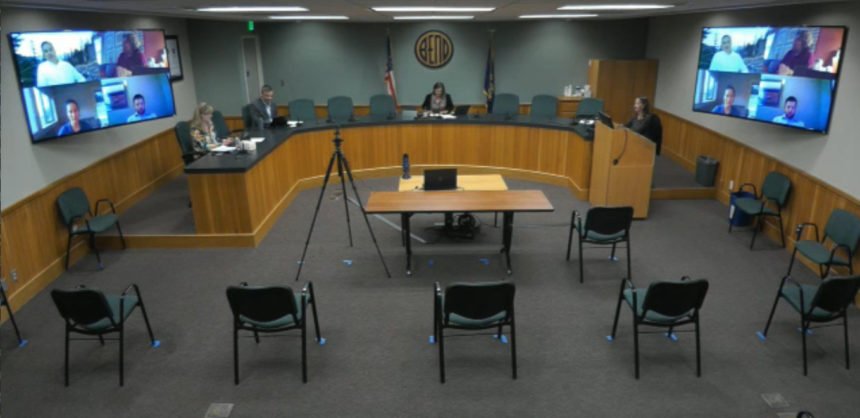Bend councilors turn down COVID-19 limits on short-term rentals

Councilor Justin Livingston called it 'a solution looking for a problem'
BEND, Ore. (KTVZ) -- Bend has been known for a long time as a tourist town, and the debate over that vision intensified in recent years with a rise in the Airbnb-style short-term rentals in long-established neighborhoods – hollowing them out, critics said.
But that was then, and now is COVID-19.
Bend city councilors -- in a video teleconference meeting due to the virus outbreak – wrestled for more than an hour Wednesday night with a staff proposal to impose temporary restrictions on short-term rentals, similar to Deschutes County’s, including a potential $750-a-day civil penalty.
But in the end, a majority said they felt enough was being done already, at the state and local level, to encourage social distancing and discourage tourism to keep Oregon’s COVID-19 numbers relatively low. So with a majority not on board, there was no vote on the measure that in Councilor Justin Livingston’s view was “a solution looking for a problem.”
All of the council praised the community for taking the governor’s stay-home order seriously, for the most part. But several spoke of the need to balance risks in a time of deep economic troubles, and noted the already in place city administrative order strongly discouraging tourism and other non-essential travel.
Mayor Sally Russell, who said she was leaning toward supporting the proposal, urged her far-flung colleagues to first share some “high-level” thoughts about the resolution before the usual nitty-gritty wordsmithing. But they never really got there.
Councilor Barb Campbell said the risk of the “really nasty disease” to her overwhelmed the relatively low numbers so far in Oregon and Deschutes County. She also said being consistent with the county was important: “We don’t want to be any signal where we are the place you can come and enjoy the COVID crisis in beautiful Bend,” she said.
Livingston noted that occupancy rates are already extremely low: “I don’t think picking on short-term rentals … (it) isn’t the right or equitable thing to do.”
Councilor Bill Moseley noted the devastating economic impacts of the virus already and said, “The reality is, we’re pitting the hopes and dreams of people against each other. I worry that if we proceed with a health-only approach on some of these things that we risk a depression. … There’s a lot of real risks here, and we need to tread lightly. I do think health is important, but we need to do it in a logical way.”
Moseley said some residents had become “xenophobic,” saying “’we don’t want certain kinds of people in our neighborhood,’" adding, "I don’t think this is a compassionate or logical measure.”
Councilor Chris Piper also spoke of a balance – and of the pain of having to lay off almost half a workforce. He said short-term rental property managers are “doing their best” and many have turned down reservations: “Nobody wants COVID-19 to spread in this community,” he said. But he later said he didn’t favor the resolution, “because of what we’re already doing.”
Councilor Bruce Abernethy said his wife is a doctor, and he’s “at risk of being banished to the guest bedroom” if he didn’t support the resolution, but added a bit later, “I think the voluntary approach is working.”
City Manager Eric King told councilors staff had prepared alternate language that would include hotels as well, if councilors wanted to be broader and not appear to be singling out the small rental properties.
But Livingston gave a clue to the devilish details when he noted the proposal didn’t lay out what documentation would be required, should a complaint be filed that could lead to the hefty penalty. He said a friend with a short-term rental was worried the policy wouldn’t be applied evenly, and could kick folks out, rather than chance the $750-a-day penalty for a $65-a-night rental.
Once a majority of four councilors weren’t on board, there was no motion to bring the proposal to a vote.
Councilor Genna Goodman-Campbell then offered thanks to all in the community being diligent on issues such as keeping physical distances. “We’re not just lucky that we’ve dodged a bullet here – these are conscious decisions” that have had an impact
Piper said, “Just because we’re not going through with this resolution doesn’t mean to ease up on what we’re already doing day to day – social distancing, masking up every day.” He praised the front-line workers, including those beyond the hospital, at the grocery stores and the line.
“We’re all front-line people,” he said. “We still have to be very diligent. I don’t think you can say we dodged a bullet. Everybody is doing their best to mitigate the risk.”
